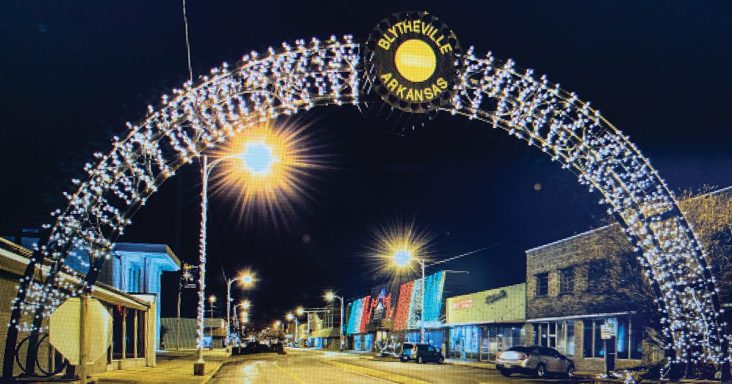Lights of the Delta continue to benefit Mississippi County
by January 10, 2024 9:10 pm 713 views

For several years, cotton gin owner Bo Adams put up Christmas displays on his property in Mississippi County. As the years passed, the displays grew larger and more elaborate and along with it came bigger and bigger crowds.
Weary of the large crowds and work involved, Adams decided in 2001 he didn’t want to erect the 14 displays he owned on his property, but he wanted the displays to stay in Mississippi County. That’s when Lights of the Delta was born, Executive Director George Hubbard told Talk Business & Politics.
Each year, the massive displays draw up to 35,000 tourists into the county, he said. Lights of the Delta is displayed at the former Blytheville Air Force base. The 1.5-mile trek now has 56 major displays and several smaller ones, he said. It costs about $160,000 per season to put on
About 80% of the people who visit are from outside the county, he said. Other parts of Northeast Arkansas, western Tennessee, and the bootheel of Missouri are the primary areas they pull tourists from. People from at least 40 different states and at least 60 counties in Arkansas came to see the lights last year, Hubbard said.
The displays are open to the public just after Thanksgiving each year and run until several days after Christmas.
“Our weekends are our busiest nights,” he said. “If the weather is good, we can bring in as many as 5,000 people on a weekend. We had several reasons why we wanted to do this. We understood the positive economic impacts it could have, and it was also a quality-of-life metric that we could add to the community,” said Hubbard, who is not paid for his work as director.
Gauging the total impact the lights have on the county’s economy is a challenge, Mississippi County Regional Chamber of Commerce Liz Smith said. No study has ever been conducted to study the impacts, but several businesses including restaurants near the former air base report significant upswings in customers during the season, she added.
“Coming up with an absolute number would be difficult,” Smith said. “There’s no question it has a positive economic impact, especially for some of our restaurants. It’s an asset to our community.”
Since the former U.S. Air Force base closed in the early 1990s the county has struggled with population declines and economic development. The county has a population of 38,896 as of 2022, a 20% drop since 2010, according to the U.S. Census Bureau. The median household income in the county is about $50,000 which is below state and national averages.
On a positive economic note, there has been a massive steel industry expansion in the county during the last decade, and it is now known as the most active steel producing county in the country.
Civic and business leaders have also been pushing to build a Cold War Center, a museum dedicated to the Cold War at the former air base not far from where the lights are displayed.
The Lights of the Delta movement may have actually begun in 1995, Hubbard said. Main Street Blytheville raised money to buy all white holiday lights to decorate the downtown area. When Adams wanted to donate the displays, it was Main Street that took them, he said.
Each year, they added more displays and by 2006 an independent, nonprofit Lights of the Delta organization was formed. It still takes care of the lights in Downtown Blytheville, Hubbard added.
When it first started, Lights in the Delta was one of the few light displays in the Mississippi River Delta region. It has several unique displays that aren’t found anywhere else, Hubbard said. Those include a Johnny Cash themed display, a Blytheville Bus station display, and John Grisham display.
Grisham, the author of best-selling books such as “The Firm,” “A Time to Kill,” and “The Rooster Bar,” got his first break in the industry when local bookstore owner Mary Gay Shipley allowed him to sell his books in her store. The display is themed from Grisham’s book “A Painted House” which is set in Mississippi County. Shipley came up with an innovative way to pay for the $25,000 display.
She asked the publishing company of the book to cover the cost, but it refused. She then asked the company to donate 1,000 books. Grisham agreed to sign all of them and each was auctioned off for $50 a piece. They were able to raise about $30,000 Hubbard said.
“Mary Gay always comes up with something,” Hubbard said with a laugh. “I thought that was pretty creative.”
In addition to the lights, there is a Santa’s workshop, hayrides, concessions, and other amenities. It only costs $10 per car and they’ve been able to keep the cost down thanks to 30 local sponsors that help cover expenses, he said.
Most of the workers are volunteers. Site foreman Charles Moody is one of the few full-time employees they have. He works on the displays year-round. Several of the displays are so large they cannot be taken down and remain in place throughout the year. Even with older displays, they attempt to change them slightly so former visitors will get a new experience if they return, he said.
One new component this year has been allowing students to design two of the displays. Grade schoolers were allowed to submit ideas for original displays and two were selected, Hubbard said. The two displays don’t look like any of the other professional displays — and that’s a good thing he added.
“They are the hit of the Lights this year…They look nothing like our other displays. I think it’s something we will continue to do.”
